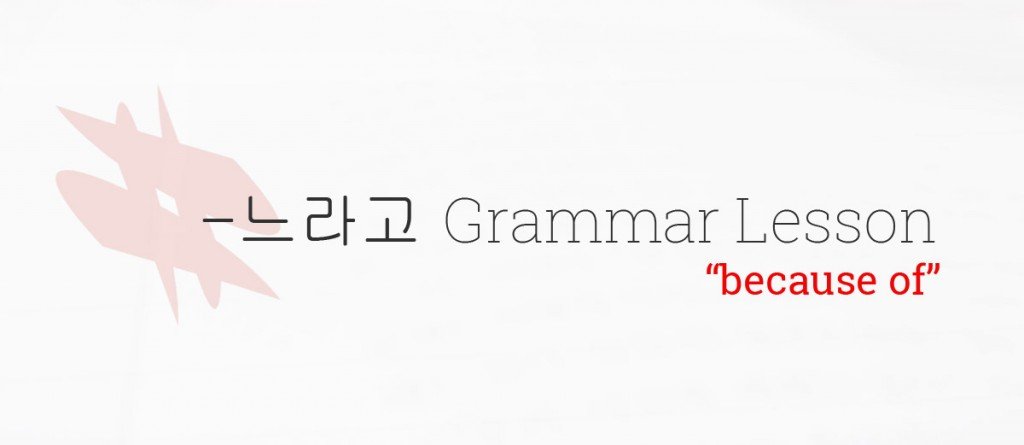– 느라고 Grammar Lesson – “Because of”

– 느라고 Grammar Explanation
Maybe you have noticed the large amount of ways to express cause or reason in Korean. Well, in this lesson, we are going to take a look at yet another one. The – 느라고 grammar pattern usually translates to “because of” or “so” in English and only has one shape which makes conjugation very simple. There are however many rules that you need to be aware of.
공부하느라고 정신이 없어요.
I’ve got my hands full studying.
Usage
| AVST+느라고 | Action Verb stems ending in both vowels and consonants. |
| (AVST+느라) | This pattern can be shortened to – 느라 with no change in meaning. |
| 하다 | 하느라고 |
| 먹다 | 먹느라고 |
| 자다 | 자느라고 |
Examples
청소를 하느라고 힘들었어요.
= It was really hard to clean. (cleaning caused me to use my strength)
저녁식사를 하느라고 바쁘시겠어요.
= I guess you’re busy eating dinner. (I assume you’re eating dinner which would cause you to be busy.)
피아노를 사느라고 돈을 모두 써 버렸다.
= I spent all my money buying a piano. (buying the piano is the reason I spent all my money)
형은 어제 책을 읽느라고 밤을 새웠다.
= My brother stayed up all night yesterday reading a book. (reading the book was the reason he stayed up all night)
The following clause has to be negative
One important thing that separates this from other similar patterns is that the following clause has to be negative or opposite to the speaker’s expectations or desires. In other words, it sounds unnatural if the conclusion is positive or in anyway desirable to the speaker.
열심히 공부하느라고 시험을 잘 봤어요 (X)
열심히 공부해서 시험을 잘 봤어요 (O)
= I studied hard so I passed the test.
시험공부를 하느라고 바쁘게 지내고 있어요. (O)
= I’m busy studying for a test.
The two clauses happen simultaneously
In this grammar, the action described in the preceding clause takes place at the same time as the action in the following clause. So by saying “I can’t go to school because I played games” using this grammar, you’re implying that the game you played took place during the time where you should have gone to school or been in school.
The subject must be the same
For this grammar to work, the subject of both clauses has to be the same.
저는 자느라고 형은 화가 났다 (X)
= Because I was asleep, my brother got mad.
No propositive or imperative forms
Since you are describing the result or consequence of an action, propositive or imperative clauses can not be used in conjunction with this grammar.
일하느라고 아무데도 가지마세요 (X)
일하니까 아무데도 가지마세요 (O) (a bit weird of a sentence though.)
= You’re working so don’t go anywhere.
Make sure to check out our lesson on the (으)니까 grammar pattern if you haven’t already done so.
일하느라고 아무데도 가지 못 해요 (O)
= Because I’m working I can’t go anywhere.
Only the consequence of the subject’s actions
One of the trickier thing about this grammar that tests will often challenge you on is that you can only use it with actions the subject is responsible for himself or herself.
바쁘느라고 (X)
생기느라고 (X)
비가 오느라고 (X)
시간이 없느라고 공부를 못했어요. (X)
= I didn’t have time so I couldn’t study
어제 늦게까지 컴퓨터 게임을 하느라고 공부할 시간이 없었어요. (O)
= I played games until late last night so I didn’t have time to study.
Past tense can not be added to the verb that precedes -느라고
Tense markers should come at the end of the sentence or the following clause and not before -느라고
게임을 했느라고 학교에 늦었다. (X)
게임을 했느라고 학교에 늦다. (X)
게임을 하느라고 학교에 늦었다. (O)
= I was late to school because I played games.
Use with 수고하다
Furthermore, you can use this with 수고하다, 고생하다 and similar expressions.
숙제를 다 하느라고 수고했어요.
= Good job doing all the homework.
The reason or cause can not be an intention for a future action.
You might feel tempted to use this pattern to express sentences like “I was going to wake up early next day so I slept early.” However, for those types of sentences where you describe something where the two clauses are not taking place at the same time (go to bed early = day 1, wake up early = day 2), you should use the (으)려고 structure.
다음날 아침에 일찍 일어나느라고 일찍 잤어요. (X)
다음날 아침에 일찍 일어나려고 일찍 잤어요. (O)
= I was going to wake up early next day so I slept early.
Please like or share if you found this useful. And if you have any questions or something else on your mind, make sure to let us know by leaving a comment below and we will do our best to help you out!
By: Kimchi Cloud




